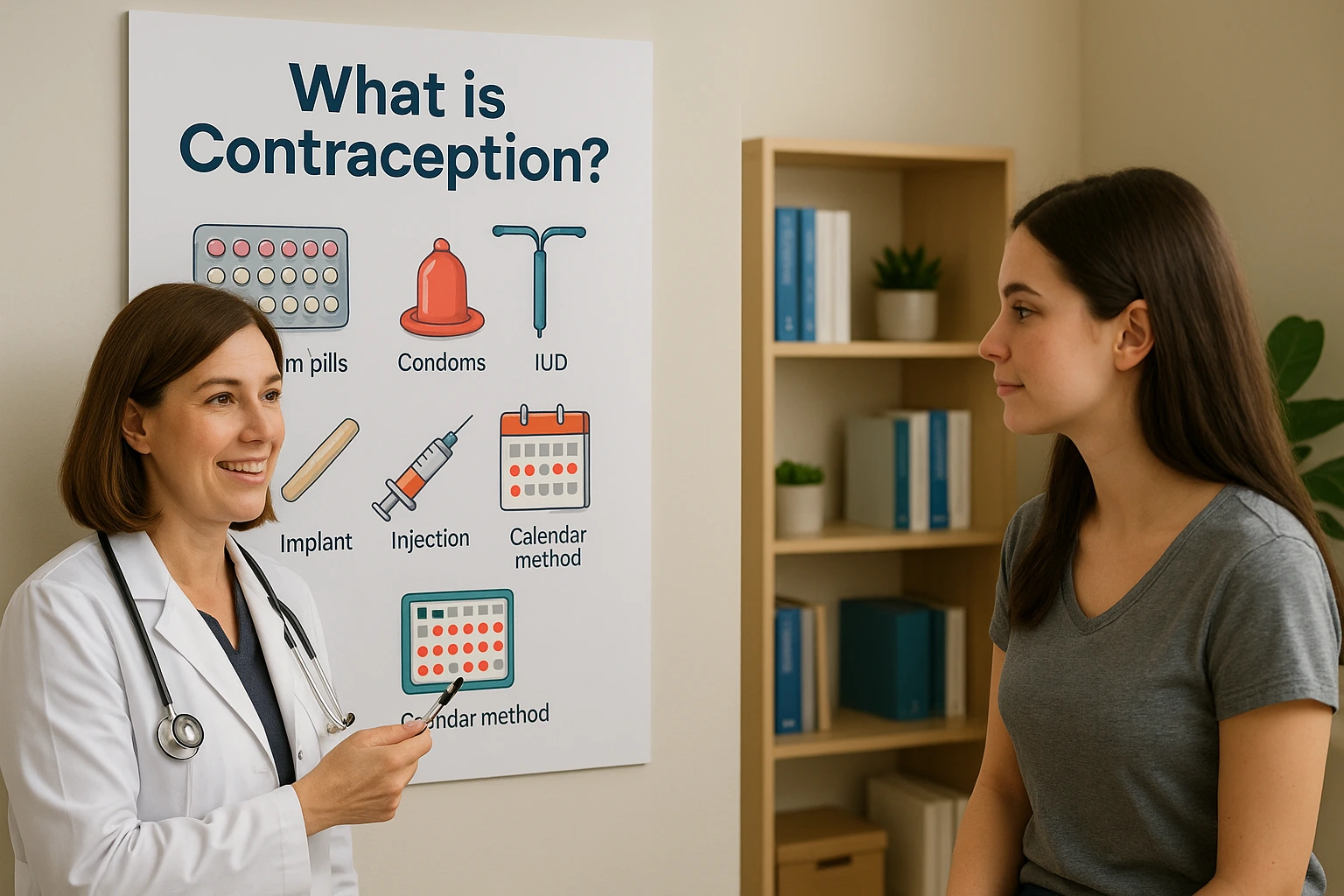The menstrual cycle is not just about menstruation—its impact extends beyond just the reproductive system, affecting various aspects of a woman’s health. From influencing mental health to affecting heart health, the menstrual cycle plays a crucial role in maintaining overall well-being. In this blog, we’ll explore how the menstrual cycle can affect other health issues, including physical, emotional, and mental health, and discuss why it’s important to monitor your cycle for better health outcomes.
What is the Menstrual Cycle?
The menstrual cycle is the monthly process in which a woman’s body prepares for potential pregnancy. It typically lasts 28 days, though it can vary from woman to woman, ranging from 21 to 35 days. The cycle involves several key stages, including:
- Menstrual phase: Shedding of the uterine lining (period).
- Follicular phase: Hormonal changes lead to egg development.
- Ovulation: Release of a mature egg from the ovary.
- Luteal phase: Hormones prepare the uterus for pregnancy or for menstruation if pregnancy does not occur.
Throughout this cycle, hormones like estrogen and progesterone fluctuate, impacting not only the reproductive system but other body functions as well.
How the Menstrual Cycle Affects Mental Health
1. Mood Swings and Irritability
The fluctuation of hormones during the menstrual cycle can have a significant impact on a woman’s mood. This can lead to irritability, mood swings, and in some cases, more severe symptoms such as premenstrual dysphoric disorder (PMDD).
During the luteal phase (the second half of the cycle), progesterone levels increase, which can cause feelings of anxiety or sadness. The decrease in estrogen levels after ovulation can also contribute to depression or irritability.
Common symptoms:
- Mood swings
- Anxiety
- Fatigue
- Irritability
2. Increased Stress Levels
The hormonal fluctuations in the menstrual cycle can activate the body’s stress response, causing an increase in stress. This is especially noticeable before and during menstruation when levels of estrogen and progesterone drop. Additionally, women who experience heavy periods or painful cramps (dysmenorrhea) may feel more stressed or overwhelmed.
How the Menstrual Cycle Affects Physical Health
IVF removes the unknowns. It brings conception into a space where timing is tracked, choices are clear, and each step is backed by science.
Some couples start here. Others arrive after rounds of IUI. Either way, this is a process built for control, clarity, and results.
1. Heart Health
The menstrual cycle can also influence heart health. Research shows that estrogen has protective effects on the cardiovascular system, and the drop in estrogen levels just before menstruation may have an impact on heart rate and blood pressure.
Some studies suggest that women may experience higher blood pressure and increased heart rate just before their period. This could be a result of hormone-induced changes in the autonomic nervous system.
2. Digestive Health
The hormones involved in the menstrual cycle can also affect the digestive system. Many women experience gastrointestinal symptoms like bloating, cramps, and constipation during menstruation. This is due to the influence of prostaglandins, which are chemicals that help the uterus contract during menstruation, but can also affect the smooth muscles of the digestive tract.
Increased progesterone levels in the luteal phase can slow down digestion, leading to bloating or constipation, while low estrogen levels just before menstruation can lead to more frequent bowel movements.
3. Pain and Inflammation
Pain and inflammation can be more prominent during certain times of the menstrual cycle. Many women experience cramps (dysmenorrhea) caused by contractions of the uterus, which can lead to lower abdominal pain, back pain, or even headaches. Prostaglandins, the hormones that cause these contractions, also increase inflammation in the body.

How the Menstrual Cycle Affects Reproductive Health
1. Fertility
The menstrual cycle is closely tied to a woman’s fertility. Ovulation, the release of a mature egg from the ovaries, occurs around the middle of the cycle, and this is the most fertile period for a woman. The luteal phase (post-ovulation) helps the body prepare for potential pregnancy.
Women with irregular cycles may have difficulty tracking ovulation, making it more challenging to conceive. Conditions like PCOS (Polycystic Ovary Syndrome) and endometriosis can disrupt the normal menstrual cycle and make conception harder.
2. Polycystic Ovary Syndrome (PCOS)
PCOS is a hormonal disorder that affects many women of reproductive age. Women with PCOS may experience irregular periods or no periods at all. This condition can affect ovulation, making it more difficult to conceive. PCOS also causes an increase in androgens (male hormones), which can lead to symptoms like excessive hair growth, acne, and weight gain.
How the Menstrual Cycle Affects Skin Health
1. Acne Breakouts
Many women experience changes in their skin during their menstrual cycle. Hormones such as androgens and estrogen can affect the sebaceous glands in the skin, causing an increase in oil production. During the luteal phase, higher levels of progesterone can trigger acne, especially around the jawline and chin.
2. Skin Sensitivity
In the days leading up to menstruation, hormonal fluctuations can cause increased skin sensitivity, leading to redness, irritation, or flare-ups of conditions like eczema or rosacea. Many women notice these changes in their skin in the week before their period begins.
How to Manage Health Issues Related to the Menstrual Cycle
1. Track Your Cycle
Understanding the phases of your menstrual cycle can help you predict and manage symptoms. Tracking your cycle through apps or calendars can help you identify patterns in mood, pain, and other health issues, allowing you to make adjustments in lifestyle or seek medical advice when necessary.
2. Maintain a Healthy Lifestyle
- Eat a balanced diet: Nutrient-rich foods can support hormone balance and overall health.
- Exercise regularly: Regular physical activity can reduce menstrual pain, improve mood, and support heart health.
- Manage stress: Practicing relaxation techniques like yoga, meditation, or deep breathing can help reduce stress levels and improve mental health.
3. Maintain a Healthy Lifestyle
- Eat a balanced diet: Nutrient-rich foods can support hormone balance and overall health.
- Exercise regularly: Regular physical activity can reduce menstrual pain, improve mood, and support heart health.
- Manage stress: Practicing relaxation techniques like yoga, meditation, or deep breathing can help reduce stress levels and improve mental health.
4. Consult with a Healthcare Provider
If your menstrual cycle is causing significant health issues, such as severe pain, heavy bleeding, or mood disorders, it’s important to seek advice from a healthcare professional. They may recommend treatments such as hormonal birth control, medications for pain relief, or therapies for conditions like PCOS.
Conclusion
The menstrual cycle is a complex process that has a far-reaching impact on various aspects of a woman’s health. From influencing mental health to affecting heart health, skin health, and reproductive health, it’s essential to recognize how your cycle can affect your well-being. By tracking your cycle, maintaining a healthy lifestyle, and consulting with a healthcare provider when necessary, you can better manage the health issues associated with menstruation.
Frequently Asked Questions (FAQs)
How does the menstrual cycle affect mental health?
Hormonal fluctuations during the menstrual cycle can impact mood, causing irritability, anxiety, or even depression. These symptoms are often more noticeable during the luteal phase.
Can the menstrual cycle cause digestive issues?
Yes, many women experience digestive changes such as bloating, constipation, or diarrhea due to hormonal fluctuations during different stages of the menstrual cycle.
How does the menstrual cycle impact skin health?
Hormonal fluctuations, especially during the luteal phase, can lead to acne breakouts, skin sensitivity, and other skin conditions. Managing stress and following a skincare routine can help alleviate symptoms.
